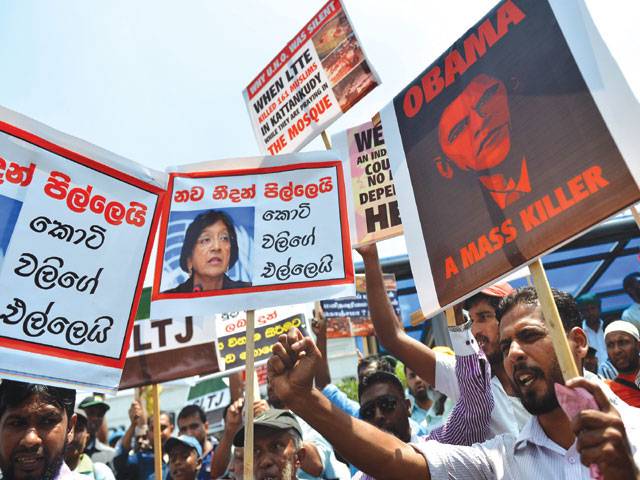GENEVA : UN rights chief Navi Pillay on Wednesday urged the international community to launch a probe into alleged war crimes in Sri Lanka in 2009 and ongoing violations in the country.
“An international inquiry is not only warranted, but also possible, and can play a positive role in eliciting new information and establishing the truth where domestic inquiry mechanisms have failed,” Pillay told the United Nations Human Rights Council in Geneva.
Pillay faulted the independence of Sri Lanka’s own efforts to shed light on the events of five years ago, when thousands of ethnic Tamils died as the army finally crushed a 37-year Tamil insurgency. She said that it was crucial to recall the “magnitude and gravity” of the violations allegedly committed by both the government and Tamil Tiger rebels, who were known for their trademark suicide bombings.
The 1972-2009 conflict claimed 100,000 lives, according to a UN estimate. In 2011, UN monitors said that tens of thousands died during the army’s final offensive.
“We are thus recommending the Council to establish an independent inquiry mechanism to further investigate the alleged violations of international human rights and humanitarian law and monitor domestic processes,” Pillay said.
“This is essential to advance the right to truth for all in Sri Lanka and create further opportunities for justice, accountability and redress.”
Pillay’s remarks came on the eve of a key vote at the 47-nation council - the UN’s top human rights forum - on a resolution sponsored by the United States demanding accountability in Sri Lanka.
Sri Lanka’s ambassador to the UN in Geneva, Ravinatha Aryasinha, rejected Pillay’s call and Washington’s drive, saying they were part of a “preconceived, politicised and prejudicial agenda” which flew in the face of the facts on the ground.
“This reflects bias and is tantamount to an unwarranted interferences in the internal affairs of a sovereign state,” he told the council.
Aryasinha also rejected claims of abuses faced by the Tamil community since 2009, and insisted that the process of national reconciliation was moving forward in Sri Lanka.
“There are attempts to portray Sri Lanka as a country in which human rights violations are ongoing. The so-called ongoing issues, if any, are only sporadic and far from being perpetuating in nature,” he said.
“Such incidents, if any, by no means make Sri Lanka an exception to any other country, let alone a country emerging from a protracted conflict.”
Sri Lanka’s President Mahinda Rajapakse, who has tightened his grip on power after crushing the Tamil separatists, has argued that he is being unfairly targeted by Western nations.
The United States, European Union, Britain, Norway and Japan were among countries pressing for accountability during Wednesday’s debate.
But Sri Lanka won vocal backing from nations including Cuba, Venezuela, Vietnam, China, Pakistan and Russia.
Saturday, April 20, 2024
UN rights chief urges probe of Lankan war crime claims

Caption: UN rights chief urges probe of Lankan war crime claims
PM Shehbaz strongly condemns attack on Customs officials in DI Khan
12:24 PM | April 20, 2024
ECP all set to conduct by-polls in 21 constituencies tomorrow
11:43 AM | April 20, 2024
US considers over $1bn weapons deal for Israel amid Middle East tensions
11:09 AM | April 20, 2024
Bilawal demands govt to hold ‘tripartite dialogue’ to curb terrorism
10:58 AM | April 20, 2024
Policitising Tragedy
April 20, 2024
Tehran to Rafah
April 20, 2024
A New Leaf
April 20, 2024
A Tense Neighbourhood
April 19, 2024
Dubai Underwater
April 19, 2024
Dangers of Deepfakes
April 20, 2024
Feudalism
April 20, 2024
Kite tragedy
April 19, 2024
Discipline dilemma
April 19, 2024
Urgent plea
April 19, 2024
ePaper - Nawaiwaqt
Advertisement
Nawaiwaqt Group | Copyright © 2024





